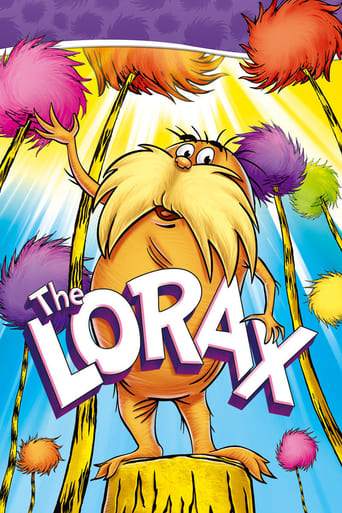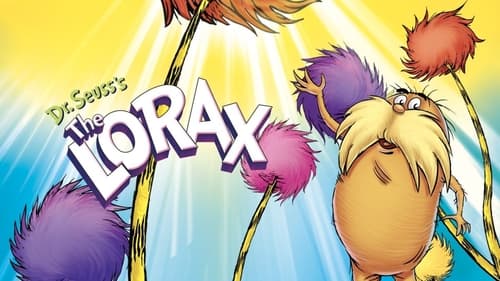TheBlueHairedLawyer
When a little boy living in what appears to be a polluted brownfield pays a visit to a lonely and depressed industrialist, called the Once-ler, he tells the boy a story of how he polluted the earth cut down every last tree and drove the animals away, much to the annoyance of some sort of tree creature called the Lorax.This was made in 1972 around the time Silent Spring by Racheal Carson had come out, and around the time of the Love Canal disaster and the beginning of the environmental movement, so it's mostly a load of hippie propaganda making out businesses, factories and industry to be evil. And what's wrong with pollution, I love pollution, who cares about the planet? I litter, pour chemicals, don't ever recycle, and I'm proud of it! However, the difference between this and the 2012 animated film is that the animation was better, the voice acting is better, the characters are more planned out and rather than inserting crude humor and romance they stick to the book with this one.It is rather biased and one-sided, but it's not a bad cartoon for kids. But you know what would be nice? If nature and pollution could co-exist with none of this crazy hippie extremism.
Horst in Translation ([email protected])
This may possibly be my favorite animated movie from the famous Dr. Seuss. It has the usual witty rhymes and it has one actor I really like, Eddie Albert, already in his sixties when this was made, and prolific voice actor who does a good job here in portraying the Lorax as well as his antagonist, The Once-ler. Also, it's a topic that appeals to me more than for example the one in the Grinch.At the beginning we see baboons and fish dancing happily though the forests and the green nature, but with the arrival of the Once-ler everything goes south. He starts building an industry at the expense of the nature and thus the Lorax, described as an an old forest creature that looks like the mix between walrus and hamster, is called into action to talk reason into the businessman. Sadly all attempts and neat rhymes from the little thing fail and more and more trees fall. Consequently, also the baboons and fish suffer and, eventually, leave for good. Growth and pollution increase rapidly and more and more trees fall until finally the very last one hits the ground, in what is really a sad moment and well displayed by the makers of the film. As there's no more raw materials left, the people leave the place and leave back an environmentally ruined area. The result is the Once-ler being equally ruined.It's a good morale and it's a story that can teach something to all of us. I guess that's also what is implied by the fact that we never see the Once-ler clearly identified, only his arms and hands creating destruction. It could be anybody. I very much recommend this short film. Not too long ago, a full feature with Danny DeVito was made based on this 25-minute short. I haven't seen that version, but as animation draws audiences in masses to theaters these days, I'm sure many have and I hope they took something from it or maybe get inspired to watch the original from the early 1970s.
Woodyanders
Wise old forest creature the Lorax (beautifully voiced by Bob Holt) tries to warn greedy and ruthless industrialist the Once-ler (also voiced by Holt with suitably sinister aplomb) about the potential harm of chopping down all the trees in the woods he's the self-appointed protector of. Alas, the Once-ler doesn't listen to the Lorax's warning and eventually lots of severe irreparable harm is wrought on the woods. This TV special manages to persuasively articulate a pertinent ecological message in a humorous, yet still relevant and respectful way without ever becoming too preachy or heavy-handed. Yes, we still do have the trademark smart and witty wordplay, a wealth of lively and engaging songs, colorful and creative animation, and a certain playful air, but underneath all the deceptive silliness is a totally serious and heartfelt concern about the well being of the earth as well as a still timely and topical statement about the evils of deforestation, the dark side of so-called progress, and the savage damage beget by corporate avarice and amorality run dangerously amok. Indeed, the environmental havoc the Once-ler brings upon the land with his factory is profoundly grim and depressing to behold. The fact that this TV special's central message hasn't dated a bit speaks volumes about its considerable artistic merit. An excellent and admirable program.
Lee Eisenberg
As Dr. Seuss's work was usually politically charged,* "The Lorax" does a good job looking at the environment. Scary is how realistic the book/movie eventually became (especially under George W. Bush). But it does have an element of hope to it. I guess that it makes sense to have Eddie Albert narrate, given his environmental work. After watching the movie, you just might feel like speaking for the trees, and all other wildlife.*"The Cat in the Hat" was promoting rebellion, "Yertle the Turtle" was about the class system, "The Butter Battle Book" was about the Cold War-era arms buildup.





